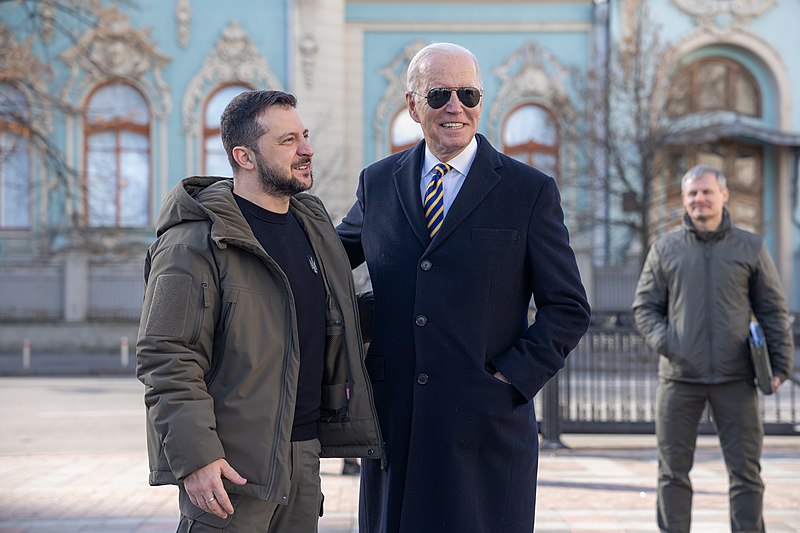 President Biden walks with President Zelensky in Kyiv during an official visit on February 20th, 2023. Photo Courtesy of The White House.
President Biden walks with President Zelensky in Kyiv during an official visit on February 20th, 2023. Photo Courtesy of The White House.
How Continued U.S. Aid to Ukraine Enhances America’s Credibility
Russian missiles killed at least five people in Western Ukraine’s Lviv region in the early morning hours of March 9th, 2023. These attacks, which targeted residential areas, demonstrate Russia’s ability to continue threatening Ukraine well beyond its setbacks in the east. As Russia’s aggression shows no sign of ending, the United States’ continuing commitment to Ukraine is vital for defending democracy worldwide and reaffirming the U.S.’ credibility as a dependable ally.
President Biden’s speeches in Kyiv and Poland oozed with principles like freedom, liberty, and, most importantly—commitment. He assured Ukraine that the United States and the NATO alliance were more unified than ever and committed to a Ukrainian victory. To some, these speeches elicited memories of John F. Kennedy’s 1963 “Ich bin ein Berliner” speech or Ronald Reagan’s 1987 demand for the USSR to “tear down” the Berlin Wall. To others, it lacked the force and memorability of those historic speeches. Though the Biden administration’s response to the invasion of Ukraine has regained some of the United States’ credibility with its allies and reputation with its adversaries, its continued aid to Ukraine is now facing a tougher path forward with a divided House of Representatives. Still, the U.S. must continue to stand resolutely behind Ukraine to send a powerful message to autocracies worldwide, especially China.
China, along with Russia, is a leading autocratic state, and Xi Jinping is closely watching the U.S. response to the war in Ukraine. In February 2023, CIA director William J. Burns warned that Xi Jinping instructed his military to “be ready to conduct a successful invasion of Taiwan.” Soon after, the CIA warned that China might provide Russia with lethal military aid. China is taking more provocative actions and employing aggressive rhetoric against Taiwan, undoubtedly to test the U.S.’ response. If U.S. aid to Ukraine collapses under pressure from domestic politics, China will take note. If the U.S. cannot stand behind Ukraine, which hasn’t needed American troops and is a fully sovereign internationally recognized state, then how will it handle an invasion of Taiwan, which doesn’t hold the same international recognition or official independent status and would require direct American intervention likely resulting in heavy casualties? Not only will China feel empowered by a collapse of aid to Ukraine, but allies like Taiwan will doubt the credibility of U.S. security guarantees and its commitment to defend democracy abroad.
Some American lawmakers are concerned about losing sight of the “Pivot to Asia” and the U.S.’s commitments to Taiwan. In December 2022, Senator Josh Hawley wrote a letter to Secretary of State Anthony Blinken with concerns over U.S. assistance to Ukraine detracting from aid to Taiwan that would be needed to fend off Chinese aggression. However, much of the assistance to Ukraine is sourced from areas that do not interfere with arms transfers to Taiwan. Further, President Biden pledged to defend Taiwan in the event of a Chinese invasion, including the deployment of American forces, in September 2022. Supporting Ukraine is not significantly detracting from the U.S. commitment to Taiwan and the Pacific; it is instead reaffirming the U.S.’ defense capabilities to all allies.
Restricting further aid to Ukraine because of concerns about assisting other states reliant on U.S. defense and security would send the wrong message to allies and adversaries. As a leader of the democratic world, the U.S. must prove its commitment to the health of democracy worldwide. Extensive support for Ukraine is the best way to demonstrate this commitment. Russia’s invasion is democracy’s most significant international threat in thirty years, and wavering support would send a message to U.S. allies that they cannot rely on American leadership in the long run. If the message that adversaries see is to wait for U.S. domestic politics to complicate its foreign policy, autocrats will feel freer to undertake aggressive policies.
The United States is recovering its reputation as the defender and arsenal of democracy with its response to the invasion of Ukraine. Continued assistance is needed to ensure Ukrainian success, but beyond the war, the U.S. must maintain its leadership role in the democratic world. While the war has complicated the pivot to Asia, the U.S. is still invested in the Pacific. Reducing aid to Ukraine would send the wrong message on the extent of America’s commitment and guarantees to Taiwan. Retrenchment is not beneficial, and the U.S. must maintain its international credibility during this critical juncture in the war and global affairs.
Public domain photo courtesy of The White House via Wikimedia Commons.





